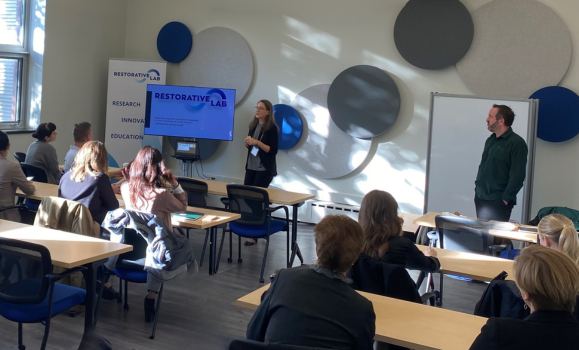News
» Go to news mainTransforming How Justice Looks and Feels Around the World

Since 1996, Restorative Justice Week has been recognized in Canada during the third week of November and provides an opportunity for Canadians to reflect on the impact and potential of restorative justice for our society.
It also offers an opportunity to raise awareness of the important work being done in communities around the world and to learn about the application of a restorative approach in many different contexts beyond the legal system.
Many of us face a variety of challenges at institutional, systemic and/or societal levels, and the justice we seek is more complicated than simply answering the questions, “What rule was broken and who is to blame?” Justice is about creating and securing the conditions for shared dignity, respect, care, and well-being.
Professor Jennifer Llewellyn, the Schulich School of Law’s Chair in Restorative Justice and Director of its Restorative Research, Innovation, and Education Lab (the Restorative Lab), has been working to shift the approach of systems and institutions to be more restorative since the 1990s.
This dedication has helped to foster and develop partnerships across universities, communities, and governments, and led most recently to her nomination for the Public Impact Award at the upcoming 21st Annual Discovery Awards, which celebrates outstanding innovators whose game-changing achievements in science and technology put Nova Scotia at the forefront of global innovation.
“The nomination for the Public Impact Award is significant because it recognizes the core mission of the Restorative Lab, which is to make a difference in the experience of justice for individuals, groups, and communities," Llewellyn shares. "Nova Scotia has been such an incredible learning lab that it seems only fitting it would base its work to mobilize knowledge for action innovation here.”
Llewellyn and the team at the Restorative Lab leverage their expertise, as well as that of their network of fellows and associates, by providing incubation space and support to projects or initiatives aiming to revolutionize the boundaries of how justice looks and feels.

Their action-oriented and community-based research has supported the development and growth of a restorative approach at the United Nations, in the Canadian military, and with the Mass Casualty Commission, among others, and continues to support justice innovations locally, nationally, and internationally.
When interviewed by Research Nova Scotia’s Beyond Research podcast in October 2023, Llewellyn said, “The work of the lab and the research that we do is inherently participatory and it’s one of the principles of a restorative approach. When you start to pay attention to relationships and interactions, then the knowledge that you need to inform how you see a problem, how you respond to a problem, and how you think about creating positive conditions for what you need, must then center the voices of those who know the most about it.”
When organizations, systems, and communities begin to implement a restorative approach, they support communities to realize systemic change. In turn, this increases opportunities, mutual understanding, collaboration, and helps to reimagine broken, ineffective systems and structures, which helps build an inclusive world where all people are valued, connected, and engaged.
Says Llewellyn, “A restorative approach is central to the urgent and important work of justice transformation that is needed in order to support our individual and collective well-being.”
Recent News
- Assistant Professor Liam McHugh‑Russell ft in "Dispute at B.C. ports may reignite over employers' push on automation: expert"
- Professor Emeritus Wayne MacKay ft in "Legal column: What's the legal line between freedom of expression and hate speech?"
- Professor Emeritus Wayne MacKay ft in "The Todd Veinotte Show, July 8, 2024"
- Standing Up For The World
- Professor Emeritus Wayne MacKay ft in "Victim believes hate motivated downtown Halifax attack: ‘People will be terrified to hold their partner’s hand walking down the street’"
- Professor Emeritus Jocelyn Downie ft in "Opinion: Forced transfers for assisted dying are cruelty cloaked as compassion"
- Professor Emeritus Wayne MacKay ft in "Be practical, not idealistic to scrap partial‑day plans: expert"
- Professor Emeritus Jocelyn Downie ft in "A British Columbia court challenge to end forced transfer for medical assistance in dying"
